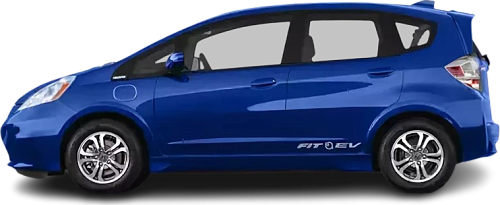USA EV Comparison: BMW i4 M50 vs Honda Fit EV Gen 1
Struggling to Decide? Let AI Help!
Your AI Summary Is Ready!
General Info
Since both vehicles have been discontinued, they are now only available on the used car market. You can get the BMW i4 M50 (2021-2024) for as low as $36990, while the Honda Fit EV (2013-2015) begins at $4100.
The BMW i4 M50 (2021-2024) is a Liftback, whereas the Honda Fit EV (2013-2015) is a Hatchback.
| Property | BMW i4 M50 | Honda Fit EV Gen 1 |
|---|---|---|
| Years of Production | 2021-2024 | 2013-2015 |
| Current Status | Discontinued | Discontinued |
| Country of Manufacture | Germany | USA |
| Body Style | Liftback | Hatchback |
| Market Availability | EU, USA | USA |
| Price USA (Used) | $36990 | $4100 |
| GCC Score | 6.5 | 3.9 |
Range and Efficiency
While the BMW i4 M50 (2021-2024) offers a longer real-world range and a bigger battery, it is less energy-efficient than the Honda Fit EV (2013-2015).
| Property | BMW i4 M50 | Honda Fit EV Gen 1 |
|---|---|---|
| Range (EPA) | 270 mi | 82 mi |
| Range (WLTP) | 322 mi | - Range (WLTP) |
| Range (GCC) | 254 mi | 78 mi |
| Battery Capacity (Nominal) | 83.9 kWh | 20 kWh |
| Battery Capacity (Usable) | 80.7 kWh | 19 kWh |
| Efficiency per 100 mi | 31.8 kWh/100 mi | 24.4 kWh/100 mi |
| Efficiency per kWh | 3.15 mi/kWh | 4.11 mi/kWh |
| Range and Efficiency Score | 6.4 | 5.4 |
Charging
Both vehicles utilize a standard 400-volt architecture.
The Honda Fit EV (2013-2015) has no DC fast charging capability, whereas the BMW i4 M50 (2021-2024) can charge at up to 207 kW.
The BMW i4 M50 (2021-2024) features a more powerful on-board charger, supporting a maximum AC charging power of 11 kW, whereas the Honda Fit EV (2013-2015) is limited to 6.6 kW.
| Property | BMW i4 M50 | Honda Fit EV Gen 1 |
|---|---|---|
| Max Charging Power (AC) | 11 kW | 6.6 kW |
| Max Charging Power (DC) | 207 kW | - Max Charging Power (DC) |
| Architecture | 400 V | 400 V |
| Charge Port | CCS Type 1 | Type 1 (J1772) |
| Charging Score | 6.9 | 2.7 |
Performance
The Honda Fit EV (2013-2015) is front-wheel drive, while the BMW i4 M50 (2021-2024) offers an all-wheel drive system.
The BMW i4 M50 (2021-2024) boasts greater motor power and accelerates faster from 0 to 60 mph.
| Property | BMW i4 M50 | Honda Fit EV Gen 1 |
|---|---|---|
| Drive Type | AWD | FWD |
| Motor Type | PMSM (front), PMSM (rear) | PMSM |
| Motor Power (kW) | 400 kW | 92 kW |
| Motor Power (hp) | 536 hp | 123 hp |
| Motor Torque | 586 lb-ft | 189 lb-ft |
| 0-60 mph | 3.7 s | 8.1 s |
| Top Speed | 140 mph | 90 mph |
| Performance Score | 6.8 | 2.7 |
Dimensions
The BMW i4 M50 (2021-2024) boasts a more extended wheelbase.
| Property | BMW i4 M50 | Honda Fit EV Gen 1 |
|---|---|---|
| Length | 188.3 in | 161.6 in |
| Width (with Mirrors) | 81.6 in | 66.7 in |
| Width (w/o Mirrors) | 72.9 in | - Width (w/o Mirrors) |
| Height | 57 in | 60 in |
| Wheelbase | 112.4 in | 98.4 in |
Cargo and Towing
Neither car is equipped with a frunk (front trunk).
The BMW i4 M50 (2021-2024) has a towing capacity of up to 3500 lb, whereas the Honda Fit EV (2013-2015) is not officially rated for towing in the US.
| Property | BMW i4 M50 | Honda Fit EV Gen 1 |
|---|---|---|
| Number of Seats | 5 | 5 |
| Curb Weight | 5018 lb | 3252 lb |
| Cargo Volume (Trunk) | 16.6 ft3 | 12 ft3 |
| Cargo Volume (Max) | 45.6 ft3 | - Cargo Volume (Max) |
| Cargo Volume (Frunk) | - Cargo Volume (Frunk) | - Cargo Volume (Frunk) |
| Towing Capacity | 3500 lb | - Towing Capacity |
| Cargo and Towing Score | 5 | 4 |




